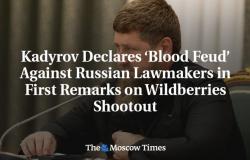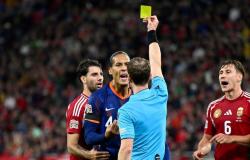Keystone-SDA
This content was published on
08. October 2024 – 17:11
(Keystone-SDA) British actress and producer Kate Winslet presented her new film “Lee” at the 20th Zurich Film Festival. The feminist movement of recent years has encouraged her to create a biopic about the American war reporter Lee Miller.
The evening before, Kate Winslet (“Titanic,” “The Reader,” “The Holiday”) was humorous and sociable at the Golden Eye Awards ceremony. During the conversation with the Keystone-SDA news agency on Tuesday in Zurich, she was serious.
The fact that “Lee” is more than just another new film for the 49-year-old Oscar winner is reflected in the strong urgency in her words. And in the gestures. For example, when she leans back thoughtfully before answering, then a moment later leans over the table and looks the other person directly in the eyes while speaking. With the independent film portrait of the American war photographer Lee Miller (1907-1977), who never really got rid of the labels “ex-model” and “muse of US photographer Man Ray”, Kate Winslet wants to send a clear message.
You worked on “Lee” for around ten years. A lot has happened in the feminist movement during this time. How have the developments influenced your project?
Kate Winslet: «I never doubted that I would make this film, but there were moments when I wondered how I was going to do it all. The feminist movement of the last few years definitely encouraged me to stick with it. But she also made me feel like it was okay to take my time with the script or securing finances. Yes, she gave me strength.”
Surprisingly, the film doesn’t focus as much on how hard it must have been for Lee Miller to make it in a male-dominated environment.
Winslet: “We didn’t intend to state it that way. It was enough for us to show that she was one of very few female war photographers. What was much more important to us was the uniqueness of their work. The nature of her photography, the way she used her Rolleiflex to meet people’s eyes through it.”
Are there documents that prove how Lee Miller felt as a woman of her time?
Winslet: “I read diary entries from her youth. Lee Miller had severe mental health issues as a teenager, and very low self-esteem. The fact that she has overcome these difficulties as an adult is remarkable.”
You’ve said in interviews how strongly you feel connected to Lee Miller. Has she made decisions that you don’t understand?
Winslet: “Unlike me, who became a mother for the first time at the age of 25, Lee Miller did not have a child at the time of the war. In that sense, of course, I can’t understand everything exactly. But no, I never questioned her decisions. But maybe that’s also because I never questioned my own conviction about making this film.”
What could Lee Miller have learned from you?
Winslet: “I’ll be 50 next year, which I think is great. And the older I get, the more I learn to slow down every now and then. To think before I speak, for example. I haven’t become more careful, but perhaps more mindful, to use a somewhat worn but appropriate word. I wish Lee could have paused for a moment.”
“Lee” is a film about a woman who has long been unfairly reduced to her time as a model. But it is also a film about war. What role does this play for you given the current world situation?
Winslet: “There will always be innocent victims in conflict. Lee’s intention to look into the dark corners, to be the visual voice of these victims, remains extremely important. I think the film gives us the opportunity to better recognize the importance of the work of war reporters. And to be appreciated.»*
*This text by Miriam Margani, Keystone-SDA, was realized with the help of the Gottlieb and Hans Vogt Foundation.





